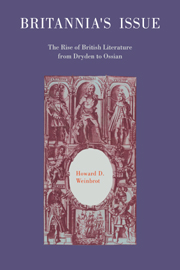Book contents
- Frontmatter
- Contents
- Acknowledgments and editorial notes
- INTRODUCTION: An overview of scope and method
- PART I CONTEXTS: INTELLECTUAL, PSYCHOLOGICAL, AND NATIONAL
- PART II TEXTS WITHIN CONTEXTS. ESSAYING ENGLAND: OUR GENIUS, OUR CLIME
- PART III GROWING ONE'S OWN. THE BRITISH ODE FROM COWLEY TO GRAY
- Prologue to Part III
- 9 GREEK JOCKEYS AND BRITISH HEROES: THE RISE AND FALL OF THE PINDARIC ODE
- 10 ODES TO THE NATION AND THE NORTH: DRYDEN, COLLINS, AND GRAY
- PART IV EXPANDING THE BORDERS. JEWS AND JESUS: THIS ISRAEL, THIS ENGLAND
- PART V CELTS, GERMANS, AND SCOTS: TOWARDS A UNITED KINGDOM
- APPENDIX: The text of Handel's “Israel in Egypt”
- Index
10 - ODES TO THE NATION AND THE NORTH: DRYDEN, COLLINS, AND GRAY
Published online by Cambridge University Press: 15 December 2009
- Frontmatter
- Contents
- Acknowledgments and editorial notes
- INTRODUCTION: An overview of scope and method
- PART I CONTEXTS: INTELLECTUAL, PSYCHOLOGICAL, AND NATIONAL
- PART II TEXTS WITHIN CONTEXTS. ESSAYING ENGLAND: OUR GENIUS, OUR CLIME
- PART III GROWING ONE'S OWN. THE BRITISH ODE FROM COWLEY TO GRAY
- Prologue to Part III
- 9 GREEK JOCKEYS AND BRITISH HEROES: THE RISE AND FALL OF THE PINDARIC ODE
- 10 ODES TO THE NATION AND THE NORTH: DRYDEN, COLLINS, AND GRAY
- PART IV EXPANDING THE BORDERS. JEWS AND JESUS: THIS ISRAEL, THIS ENGLAND
- PART V CELTS, GERMANS, AND SCOTS: TOWARDS A UNITED KINGDOM
- APPENDIX: The text of Handel's “Israel in Egypt”
- Index
Summary
DRYDEN'S “ANNE KILLIGREW”: TOWARDS A NEW PINDARIC POLITICAL ODE
Dryden's moving ode to Anne Killigrew has been read as an excessive, even ironic panegyric rather than the ode its title and third stanza proclaim:
And if no clust'ring Swarm of Bees
On thy sweet Mouth distill'd their golden Dew,
'Twas that, such vulgar Miracles,
Heav'n had not Leasure to renew.
Like others, the California editors think this an allusion to Plato in his cradle, as recorded in Cicero De Divinatione, 1. 36: “while Plato was an infant, asleep in his cradle, bees settled on his lips and this was interpreted to mean that he would have a rare sweetness of speech.” This apparent allusion, however, is twice dubious: Dryden does not claim sweetness of speech for Anne Killigrew, and Cicero does not mention distillation of honey. Pausanias in Boetics 9. 23, and Philostratus Imagines 2. 12, though, are among those who do mention that regarding Pindar. Basil Rennet relates that Pindar “was design'd by Heaven for a Divine Master in the Lyric strain,” and paraphrases the well-known Pausanias as evidence: “sleeping one Day in the Fields, while a little Boy, the Bees came and fed him with their Honey: which passes for the Occasion of his first applying himself to Poetry.” Modern heaven, the sophisticated Dryden says, is too busy to ask the bees to signal Pindaric greatness again, but nonetheless “all the Blest Fraternity of Love / Solemniz'd there thy Birth, and kept thy Holyday above” (lines 54–55). Dryden's allusion to Pindar both alerts us to Anne Killigrew's own putative odes and announces heavenly approbation of an earthly poet.
- Type
- Chapter
- Information
- Britannia's IssueThe Rise of British Literature from Dryden to Ossian, pp. 359 - 402Publisher: Cambridge University PressPrint publication year: 1993



